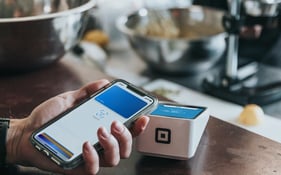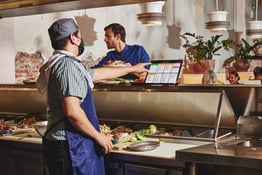Pizza is like a Netflix original series: When it’s good, it’s really good, and when it’s bad — hey, at least it’s right there. Of course, just as it takes a skilled squad to produce a Squid Game or a House of Cards, the business of making and serving delectable pies to satisfied customers has a lot of moving pieces to it. Behind every pizza operation is a team working to craft the perfect pizza for you to enjoy while you’re bingeing your miniseries of choice. And supporting that team is a whole world of tech. If you’re starting a pizza joint, you’re going to need to get familiar with those components that plug into the wall or connect to the cloud.
To orient ourselves in the pizzascape, we spoke to Luisa Castellanos, co-founder and COO of Science on Call, which offers restaurants 24/7 tech support. Castellanos is handy with all things restaurant tech — a much-sought-after quality, now even more than usual. “We rebranded and launched Science on Call in 2020, during the pandemic,” she says. “We signed our first customer in June of 2020. We ran into the fire! And since then, we’ve been helping save restaurants.”
Here are some of the elements Castellanos suggests you keep in mind as you design your perfect pizza tech stack.
Point-of-sale systems for pizza restaurants
If the beating heart of the pizza shop is the kitchen, the register is the lungs. Nowadays payment systems have to link up wallets, phones, kiosks, cash drawers and even menus alike. The go-to for most shops, Castellanos says, is Toast. Its array of features and integrations are ideal for pizza restaurants, which typically have complicated menus and large modifier sets.
“You probably have different crusts, different sizes, various sauces, special pizzas, different toppings, half-toppings — the list goes on,” Castellanos says. “And if you run out of mushrooms, with some systems you have to go in manually and change every single modifier that might involve mushrooms, on every single pizza combination. Toast has made it easier to make those changes than some other systems have.”
That synchronicity also applies to multiple locations. Castellanos mentions Antioch Pizza, which has seven northern Illinois locations. Toast enables them to standardize their menu so that it’s identical throughout the chain. Menu updates happen centrally, instead of seven times manually.
But Toast ain’t the whole game. You may also know relative newcomer Slice, best known as a delivery app for independent pizzerias looking to avoid the notoriously high commission fees associated with those other third-party delivery apps. Slice offers a bevy of additional solutions for pizzaiolos. The company’s most comprehensive package — oxymoronically dubbed Slice Complete — includes Slice Register, the “POS made for pizzerias.” Slice Register features efficient omnichannel ordering, which means orders made by phone, online, and in-person are all processed in the same place, reducing the margin of error and making reporting a snap.
The Slice Complete package includes the super-sleek POS system itself, a cash drawer, a credit card terminal, a router, and receipt and kitchen printers. The catch? You don’t get to shop around for payment processors, as Slice Register only works with Slice Payments. Slice Payments’ processing rates start at a competitive 2.5%, but Castellanos says that freedom of choice is still important to many restaurateurs.
“If your processing fee is 2.5% and you’re doing $5,000 in sales a day, that’s a lot of money over the course of a year,” she says. “With POS systems like Micros and NCR, you can use your own processor, so some restaurants will use one that offers, say, a 1.9% fee. That 0.6% savings, to them, adds up. But with some of those older systems, you’re choosing between saving a little bit more money and having a more efficient restaurant.”
Online ordering and pizza delivery tech
Processing orders is just one piece of the efficiency pie. You’ve also got to get your customers their actual pies, and fast. Pizza places were offering delivery long before the great delivery boom of 2020, maybe even since the late 19th century, when European royals began to arrange for none other than pizza to be brought to their courts. (Remember the origin story of Queen Margherita’s eponymous pizza? Yeah, we’re talking about that). But gone are the days of Italian unification-related pizza realpolitik. Heck, even placing an order by phone call can seem quaint in 2021.
Delivery’s role in pizza culture makes it a natural star In These Unprecedented Times, as pizza spots scarcely needed to pivot to do what they do best during the pandemic. It has turned out to be a go-to ghost kitchen menu hack, and even amid the gig economy, many local pizzerias still employ their own delivery drivers. “Unlike some other types of restaurants, they can justify it,” says Castellanos. “If the orders are just ‘delivery, delivery, delivery’ all day, they can have three people on staff that cycle through that, and they can afford whatever insurance they need to pay for that.”
But even a shop with dedicated delivery drivers needs marketplace apps. Pizzerias will want to consider tech solutions flexible enough to allow for different delivery scenarios. Slice, for instance, offers its own delivery service as an add-on feature. Shop owners who crave more control over the experience might check out Slice Complete, which comes with delivery management software that allows owners to split deliveries among shop employees and Slice drivers, and to track those drivers in real-time.
As for third-party delivery apps such as GrubHub, UberEats, and DoorDash most pizza shops are going to want to cross-list their businesses across them all. You’re paying high fees for the marketing reach, yes, but anymore that’s probably where your customers live. It makes it easy to be the customer in this scenario. You, on the other hand, have to track concurrent orders zinging in via disparate channels. So consider an order aggregator — software that connects every order to a single device or software.
“Many of our customers use Cuboh,” Castellanos says. “I’d say that’s the most popular aggregator, followed by Chowly and then Otter. But then again, Toast now offers integrated ordering for all of the major delivery platforms. So if you’re already using Toast for your POS, you wouldn’t necessarily need additional software to do that.”
Branding and marketing for pizza is paramount
The pizza market is saturated with appealing content so you’d better make sure your social media presence is good. “Pizza is so hip that you really have to have good branding,” Castellanos says. “The kind of pizza you serve, how it tastes — those things are almost less important than having good branding and being on multiple platforms that get the word out.”
We’ve already written about how to make your restaurant stand out on “the big four” – Facebook, Instagram, Twitter, and TikTok (tl;dr: don’t think it’s enough to throw up a mouth-watering pie pic with a witty caption and call it a day). Castellanos would remind the aspiring pizza-preneur not to neglect some of the other ways you can instill passion in your customers. “Gift cards can be huge,” she says. “That and loyalty programs. Toast makes both of those things pretty easy.”
If you’re committed to working with a team of pizza experts specifically, you can also look to Slice to handle marketing. Even the most basic package, Slice Essentials, will get you access to the Slice Rewards Loyalty Program, which rewards repeat customers of your business with points that they can put towards a free (Slice-funded!) pie from your shop. Slice’s most popular package, Slice Premium, will get you your own business website optimized for online ordering, as well as SEO and Google Reviews management.
And speaking of the big G, don’t forget its Google My Business feature. For most practical purposes, it's what people are going to see when they look for you online, and Google My Business lets you control aspects of how you show up in those results: the preferred ordering platform, your menu, up-to-date hours, and contact info. You may also want to shell out for Google ads, but if you're cash-strapped, you might start with ads on Yelp to at least get a toehold in digital marketing.
Restaurant atmosphere is still a thing
Know what else you should deliver? At least a hint of ambiance to the folks who dine in. You might not even consider it, but your customers will know something’s a little off if nothing is on. “I was at a restaurant last week and Sonos wasn’t working,” Castellanos says. “It was so quiet, to the point where it was awkward. The restaurant was actually one of our customers. I wanted to say, ‘call Science!’”
This leads us to our final recommendation. If all this tech stuff is detracting from your pizzacraft, you can always outsource it to a third-party — like Science on Call. “We really do it all,” says Castellanos. “Our customers can call, text, or email us when they need help with anything. Whether it’s their point of sale, the internet or phones, or a problem with their website or with a delivery app — Science on Call is available 24 hours a day, so that our customers can focus on making amazing food while we take care of the rest.” Whether it’s them or some other expert, there’s no harm in having someone do a job that lets you do yours better.





